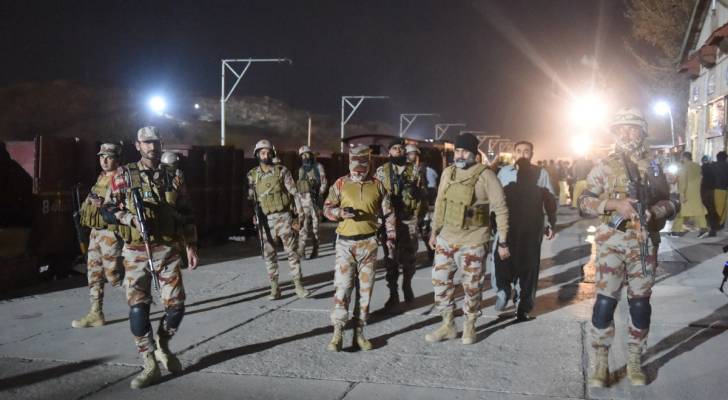Soldiers secure Mach railway station after Pakistani security forces freed some passengers (Credit: AFP)
Hostage crisis ends in violence as 27 killed in Pakistan train hijacking
Pakistan's military successfully rescued nearly 350 hostages held by militants who had hijacked the Jaffer Express train in Balochistan.
The standoff, which unfolded over two days, resulted in the tragic deaths of 27 hostages and one soldier, while the military claimed to have eliminated at least 35 militants involved in the incident.
The attack, carried out by the Baloch Liberation Army (BLA), a separatist group seeking greater autonomy for Balochistan, began on Tuesday when militants opened fire on the train, which was transporting around 450 passengers from Quetta to Peshawar. The assault occurred as the train passed through a tunnel, catching passengers off guard.
A rescued woman described the chaotic scene as akin to a "Day of Judgement." She recounted fleeing the gunfire and walking for two hours to safety. Another passenger, Mohammad Ashraf, reported witnessing over 100 armed individuals on the train, although he noted that no harm came to women and children.
Security sources indicated that the militants had been communicating with handlers based in Afghanistan, an assertion that aligns with longstanding accusations by Pakistan's military and government regarding Afghanistan's role in providing refuge to militant groups. Afghan Taliban leaders have consistently denied these allegations.
This incident underscores the deteriorating security situation in Balochistan, a region rich in minerals and of strategic importance to Pakistan. The local population, primarily composed of the ethnic Baloch group, has faced disenfranchisement and economic hardship, leading to increasing alienation from the central government. The insurgency, which has persisted for decades, has gained momentum in recent years, particularly following the leasing of the Gwadar port to China—a key project in China's Belt and Road Initiative.
The BLA has been linked to some of the deadliest attacks in Pakistan, including a suicide bombing at a Quetta train station that killed more than two dozen people last November and an attack on Chinese engineers that resulted in two fatalities the previous month.
In response to the attack, Prime Minister Shehbaz Sharif reiterated Pakistan's commitment to combat terrorism, stating that the targeting of innocent civilians during Ramadan reflects the terrorists' disconnect from Islam and the values of Pakistan and Balochistan.
Analysts have warned that such attacks necessitate urgent attention from the federal government. Abdul Basit, a Senior Associate Fellow at the S. Rajaratnam School of International Studies in Singapore, highlighted the evolving nature of the insurgency and the need for a reassessment of security strategies in Balochistan. He emphasized that the ongoing policies appear to have reached their limits, leading to repeated security failures.




